At Earl Boyles Elementary in Southeast Portland, the intoxicating aroma of Cindy Bahn’s chow mein is filling the school’s community room kitchen. She’s tossing out cooking tips as she stir fries heaping piles of noodles, vegetables, and shrimp.
Over the last six weeks of the school year, Community Ambassadors, or Embajadores de la Comunidad, have been cooking and sharing with one another during a “Recipes Around the World” series. Doing so has helped to strengthen the connections among the parent leaders who serve and represent the school’s diverse students and families.
Cooking workshops also meet the community’s request for more nutrition information and cooking skills. Food for the workshops primarily comes from the Earl Boyles food pantry, where many families receive food supports each week.
Earl Boyles students speak 30 different home languages and about 80 percent come from low-income households. The Community Ambassador program began in 2012 as a way to increase family engagement. Since then, it has stretched to accommodate a broader range of needs, driven by the community it serves and that its members are a part of.
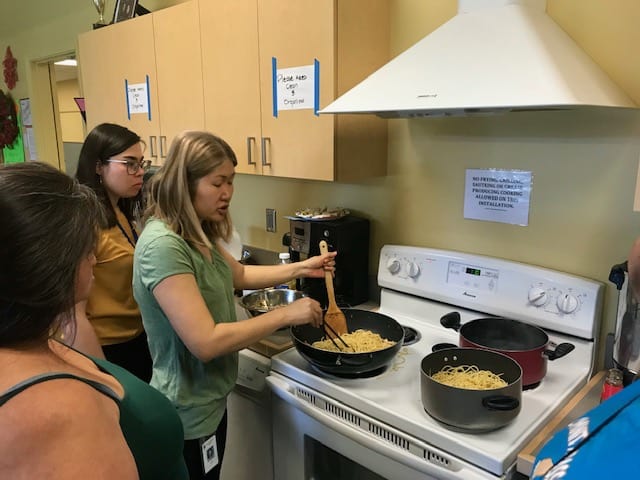
It’s been an awesome opportunity to step up and show my kids that they can do whatever they want.
Cindy Bahn in the community kitchen at Earl Boyle’s Elementary
Anyone in the Earl Boyles community—not just parents—can apply to be an ambassador. Once accepted into the program, volunteer ambassadors can pursue a range of trainings that help them to assist parents and families, including how to administer developmental screenings to children, help parents navigating LGBTQ issues, aid those who may be victims of domestic violence, or help community members experiencing housing insecurity.
“It’s been an awesome opportunity to step up and show my kids that they can do whatever they want,” ambassador Josette Herrera explained, emphasizing that the benefits of the program are personal to those who volunteer.
Sharing their Knowledge on Health
Increasingly, ambassadors have found themselves at the center of an expanding focus on health.
As understanding of the connection between health and later life outcomes has grown, so has the commitment among ambassadors to support the healthy development of the children and families at Earl Boyles and beyond. The most popular training opportunity for Community Ambassadors has been a 90-hour Community Health Worker training.
In April, Josette Herrera and two other ambassadors with Community Health Worker certification—Adriana Govea and Maria Espino—made the 2.5-hour drive to rural Douglas County. The three women shared their experiences as Community Health Workers with parents at Yoncalla Elementary School. Earl Boyles and Yoncalla are both learning laboratories in Children’s Institute’s Early Works initiative.
Govea was a volunteer and resource for her community even before she took the training to become a Community Health Worker. She described how the training she went through improved her confidence in her abilities to respond to community requests for help.
I feel fine to go to the clinics with my clients, or to the hospital. Because I can say ‘I’m a Community Health Worker.’ I have the confidence to navigate for my clients.
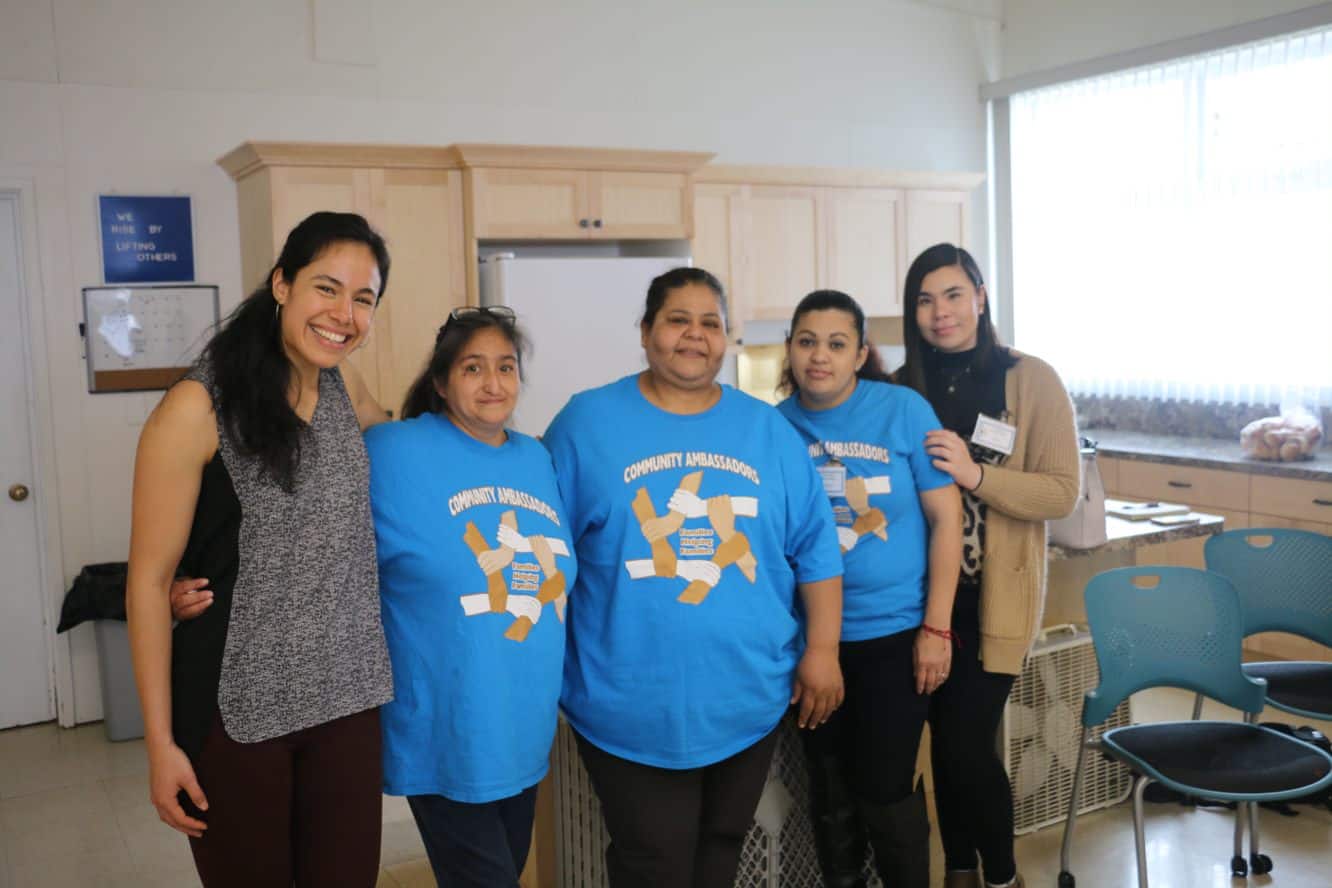
Community Ambassadors (in blue shirts L to R) Josette Herrera, Adriana Govea, and Maria Espino on their visit to Yoncalla.
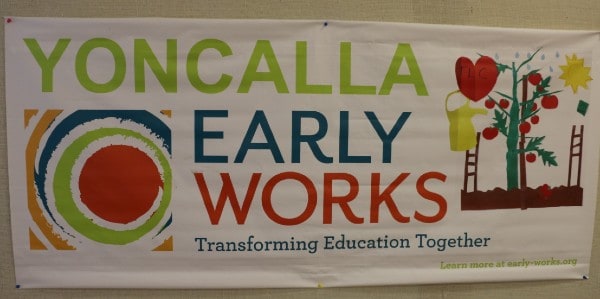
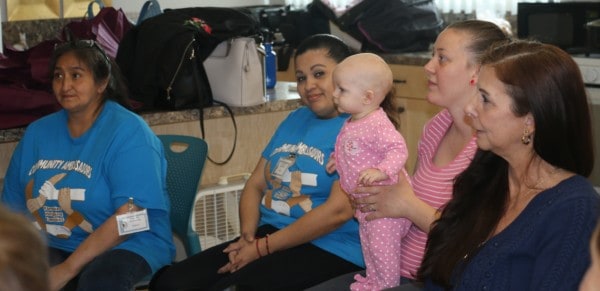
Community members from Yoncalla’s Early Works program listened to Earl Boyles Community Ambassadors discuss their experiences as Community Health Workers.
Parent-to-Parent Connection
While Yoncalla may seem worlds apart from the more urban setting their visitors call home, the concept of families helping other families was nothing new. Sharing a common culture, language, or life experience helps foster an environment where parents can feel comfortable seeking advice or assistance.
“It would be easier for some parents to communicate with [other parents],” about personal issues, Tracey Lancour, a grandparent in Yoncalla explained.
Attendees at the meeting were enthusiastic about the prospect of receiving training to help others in the community. They spoke about urgent community needs like supporting parents of children with disabilities, those suffering from mental health issues, or struggling with drug or alcohol addiction.
Families you deal with don’t care what you know, until they know that you care.
Community Based Participatory Research
Ambassadors from Earl Boyles have also played key roles in several research projects, including a recent community-based pilot research study on preschooler eating habits conducted by OHSU-PSU School of Public Health.
Community Based Participatory Research (CBPR) seeks to empower community members as partners in health research. OHSU-PSU Associate Professor Betty Izumi thanked Earl Boyle’s ambassadors and community members who helped to design, implement, interpret, and present the results.
She noted that 89 percent of the mother-child pairs who initially signed up ended up participating in the study. “That’s tremendously high,” she said, much higher than the follow through for many clinical trials. Izumi credited the ability of community members to serve as cultural brokers between families and researchers.
CBPR approaches have also been credited for helping to create health recommendations or interventions that are more readily accepted and understood by their research communities.
Back in the community kitchen at Earl Boyles, the atmosphere is celebratory.
Group members prepare to indulge in a buffet of culinary contributions from around the world—a delicious celebration and reflection of all they have contributed to their communities this year.
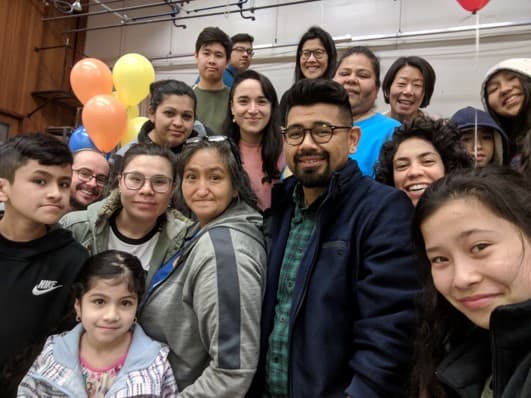
Community members took an active role in a pilot study on preschooler eating habits.
